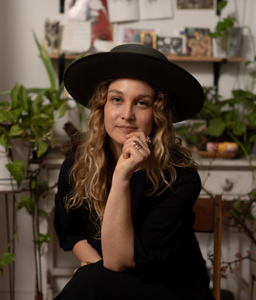Seven Questions with Alumna Phoebe Gittelson
 Phoebe Gittelson (CGS ‘12, COM ‘14) is a musician and poet who sees law as “the highest form of poetry.” After studying art history and public relations at BU, Phoebe decided that she wanted to be a force for good in the world. She’s now pursuing a law degree at CUNY School of Law, where she’s an advocate for environmental justice and equitable access to food.
Phoebe Gittelson (CGS ‘12, COM ‘14) is a musician and poet who sees law as “the highest form of poetry.” After studying art history and public relations at BU, Phoebe decided that she wanted to be a force for good in the world. She’s now pursuing a law degree at CUNY School of Law, where she’s an advocate for environmental justice and equitable access to food.
What have you been doing since you graduated from BU?
I moved from California to New York City to work for CBS until 2018. I started working as a Corporate Communications Associate and then moved up to the Corporate Communications Manager. I enjoyed working for a big media company, but it wasn’t until I worked with Josie Thomas, the Executive Vice President and Chief Diversity & Inclusion Officer, that led me to my passion for helping others. We worked together to found the Women’s Networking Group at CBS because we wanted to change the culture internally there. Another reason was to help women understand their capacity and their resources to help them in this industry. It was amazing to see this organization grow from 60 people to a national initiative at CBS. This grew my passion for organizing and helping people.
What made you choose to go to law school?
As someone who loves words and poetry, I view law as the highest level of poetry. After the election of Donald Trump in 2016, I decided to be the change that I wanted to see in the world. Growing up in California, it was easy to get fresh food, being so close to the Central Valley, produce was inexpensive and generally accessible. While in New York, I noticed that fresh produce was much more expensive, and definitely less accessible in certain low income and minority communities. I then started researching about community bias in health care, housing and food, which led me into the subject of environmental law, specifically environmental justice. Getting involved with the local CSA in my community, Local Roots NYC, helped me to understand the food systems in place and strengthened my interest in access as well as food supply chains.
What made you decide to get involved in student government at CUNY?
I was actually nominated by my fellow students and it is such an honor. My peers have diverse experiences and I learn so much from them. I think I miss them the most during this COVID-19 quarantine. My job is to uplift their voices and concerns and make sure that CUNY follows through on their promises. The school does a good job at being transparent. There are definitely aspects that need to be expanded on though; for example, I am a founder of the Environmental Justice Coalition to expand environment law and justice at CUNY because this topic relates to a lot of fields.
How have your internships, both as an undergraduate and in law school, helped prepare you for success in your field?
Internships are a wonderful privilege because most of them are not paid, but are good opportunities to have an introduction to a field. In my experience, they are learning experiences that give you insight into roles you’re interested in and demonstrates what values an organization has. If the values are not aligned with mine, then it may not be the company or job I want in life. I tried to find mentors at every internship to help guide me in this field. When I had interns, I told them that internships may not necessarily depict the actual job, but it will give them a sneak peak into the field. I definitely wish to make internships more accessible for people as they are great opportunities.
What are your goals and aspirations for your career?
I want to continue my learning experience in social justice law as well as working to create an equitable society. We need to be a resilient society. My niche is fighting against factories that hurt our ecosystems and change the foods systems that are racist and oppressive right now. I want to make changes that are sustainable to be healthier for us and for the world for the future.
What was your favorite part about your time at CGS?
My favorite part of CGS was the multidisciplinary curriculum and how it felt like a small liberal arts school at BU. I loved the humanities classes because that was where conversations about philosophy and art happened. CGS also helped me prepare for CUNY Law School because it is very similar in that they both have smaller focused general classes for the first years and then you learn about specific interests in the later years.
If you could give one piece of advice to current CGS students, what would you say?
My advice is don’t be afraid to try new things. We have this idea of what we want to do and we just need to follow what makes us happy. I always say that you should name three things that make you happy and that you need to make a career in at least one of those. Also develop relationships with professors whose work you are interested in, as those connections are really useful.
— Compiled by Natalie Seara